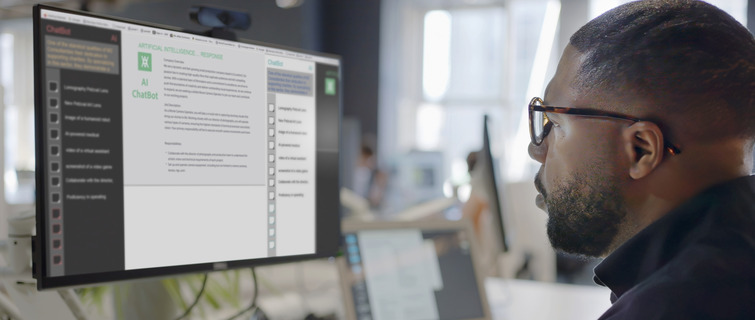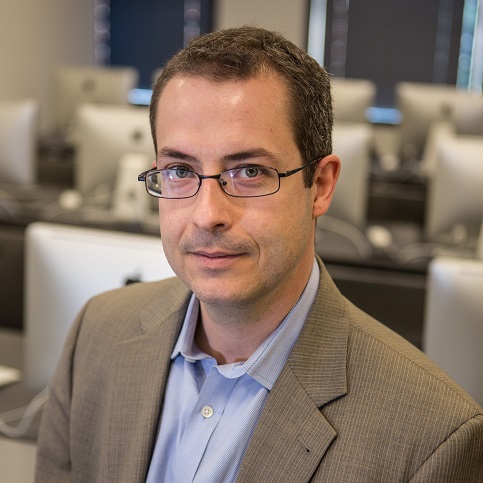
The rapid evolution of artificial intelligence (AI) is transforming industries and reshaping society. As we embark on this journey, the importance of responsible and ethical AI deployment cannot be overstated.
To highlight this need, Georgetown University’s School of Continuing Studies held the Responsible AI Intersectoral Seminar Series, an eight-session initiative aimed at bridging the gap between AI innovation and ethical implementation across various sectors. The seminar series, which drew nearly 600 attendees online and in person, was an amalgam of interdisciplinary expertise, drawing from the Master's in Supply Chain Management, Master's in Cybersecurity Risk Management, Master's in IT Management, Master's in Human Resources Management, Master's in Urban & Regional Planning, Master's in Project Management, Master's in Integrated Marketing Communications, and Master's in Journalism programs. The multidisciplinary series recognized that the challenges and opportunities of AI are not confined to a single industry but are woven through the fabric of society.
Take supply chain operations, where AI is a game-changer, offering unprecedented efficiency and predictive capabilities. By analyzing vast amounts of data, AI can optimize logistics, forecast demand, and streamline inventory management. However, this reliance on AI raises crucial questions about transparency in decision-making processes and the provenance of data used. Ensuring the accuracy and integrity of data is paramount, as it directly impacts the decisions made by AI systems. Moreover, the ethical implications of autonomous decision-making by AI systems necessitate a balanced approach. Industry experts advocate for a framework that not only harnesses the benefits of AI but also addresses its risks, ensuring that AI-driven operations are transparent, accountable, and aligned with ethical standards.
In the cybersecurity industry, AI embodies a paradox. On one hand, it acts as a formidable ally, fortifying defense systems by predicting and mitigating threats through advanced algorithms and machine learning. AI can detect patterns indicative of cyber threats, providing a proactive defense mechanism. On the other hand, that same technology can be weaponized by adversaries to escalate attacks, creating more sophisticated and elusive cyber threats. This duality highlights the ethical obligations of cybersecurity professionals to maintain digital trust and security. It underscores the need for a vigilant approach in developing AI systems that are robust against misuse while enhancing the security infrastructure.
When it comes to human resources (HR), AI holds the potential to revolutionize workplace dynamics, automating routine tasks, enhancing talent acquisition, and providing data-driven insights into employee performance and engagement. However, there are valid concerns regarding AI’s potential to perpetuate historical biases, especially in areas such as recruitment and performance evaluation. To address these challenges, the seminar series engaged with Diversity, Equity, and Inclusion (DEI) experts to explore strategies that leverage AI to promote inclusion and belonging. The goal is to develop AI systems in HR that are not only efficient but also fair and unbiased, ensuring that they contribute positively to workplace diversity and equity.
The deployment of AI in urban planning presents an opportunity to enhance city management and development. AI can assist in traffic management, urban infrastructure planning, and environmental monitoring. However, this necessitates robust ethical frameworks and transparency. As cities adopt new AI applications and codes of ethics, the role of city planners evolves. They must navigate the complexities of using AI while ensuring that the technology is transparent and trusted by diverse stakeholders. The value of data, including administrative data, must be carefully reconsidered in the context of AI’s powerful capabilities. Ensuring that AI applications in urban planning are ethical, transparent, and inclusive is crucial for building smart, sustainable, and equitable cities.
Finally, in the marketing sector, AI holds the potential to revolutionize creative processes and enhance audience targeting, with panelists expressing cautious optimism about its positive impact. However, they emphasized the need for establishing guidelines and protections to safeguard creative work and ensure ethical practices. The consensus was that AI will be a disruptive force in the industry, making it imperative for professionals to understand and embrace its capabilities. Learning, experimenting, and exploring AI’s potential now is crucial, as it will become a permanent fixture in both professional and personal spheres in the future.
As a clarion call for a collaborative exploration of AI’s potential, the seminar series elicited reflections from industry leaders who emphasized the transformative potential of AI. While there is optimism about AI’s positive impact, there is also a consensus on the need for guardrails to protect creative work and maintain ethical standards. The message is clear: Understanding and embracing AI is critical, as it will be a permanent fixture in our professional and personal lives. By bringing together diverse perspectives, it aims to foster a future where AI serves responsibly and efficiently. As we navigate the AI revolution, we must do so with a commitment to ethical principles, ensuring that AI benefits all sectors of society and contributes to a more inclusive and equitable world.

